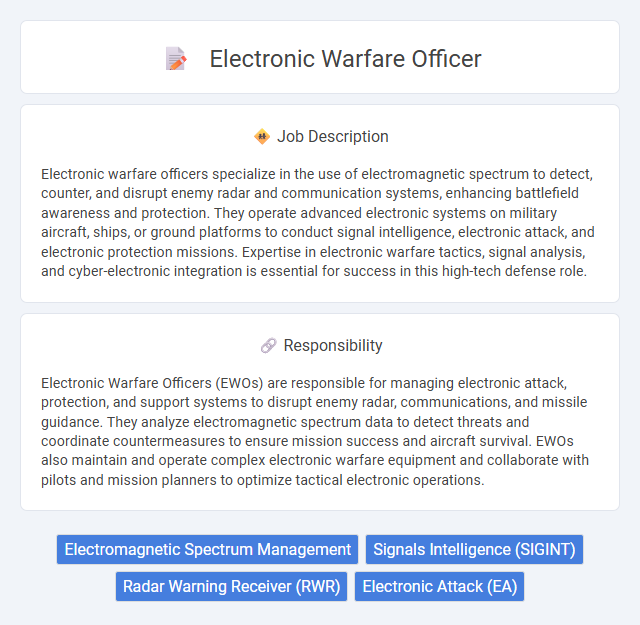
Electronic warfare officers specialize in the use of electromagnetic spectrum to detect, counter, and disrupt enemy radar and communication systems, enhancing battlefield awareness and protection. They operate advanced electronic systems on military aircraft, ships, or ground platforms to conduct signal intelligence, electronic attack, and electronic protection missions. Expertise in electronic warfare tactics, signal analysis, and cyber-electronic integration is essential for success in this high-tech defense role.
Individuals with strong analytical skills, quick decision-making abilities, and a high tolerance for stress are likely to be well-suited for an Electronic Warfare Officer role. People who thrive in dynamic, high-pressure environments and have an aptitude for technology and signals intelligence may find this job matches their strengths. Those who struggle with fast-paced situations or lack attention to detail may face challenges succeeding in this position.
Qualification
Electronic Warfare Officers (EWOs) require a strong background in electronics, communications, and computer systems, often validated by a bachelor's degree in electrical engineering, computer science, or a related field. Candidates must possess excellent analytical skills, security clearance, and proficiency in radar, signal intelligence, and electronic countermeasures. Military training programs provide specialized instruction in electronic warfare tactics, threat analysis, and operational procedures essential for mission success.
Responsibility
Electronic Warfare Officers (EWOs) are responsible for managing electronic attack, protection, and support systems to disrupt enemy radar, communications, and missile guidance. They analyze electromagnetic spectrum data to detect threats and coordinate countermeasures to ensure mission success and aircraft survival. EWOs also maintain and operate complex electronic warfare equipment and collaborate with pilots and mission planners to optimize tactical electronic operations.
Benefit
An Electronic Warfare Officer (EWO) likely experiences significant career benefits including advanced technical skills in electronic systems and signal intelligence, which may increase job marketability in both military and civilian sectors. The role can also offer opportunities for leadership development and operational experience in high-stakes environments, potentially leading to rapid career advancement. Benefits might include competitive compensation packages, comprehensive training, and access to state-of-the-art technology, enhancing both professional growth and job satisfaction.
Challenge
Electronic warfare officers face the significant challenge of navigating complex and rapidly evolving threat environments where enemy electronic countermeasures can disrupt communication and sensor systems. The probability of encountering high-pressure situations that require quick decision-making to protect assets and maintain operational advantage is considerable. Mastery of advanced electronic systems and adaptability to emerging technologies likely play critical roles in overcoming these challenges.
Career Advancement
Electronic warfare officers play a crucial role in managing and executing electronic attack and defense strategies, which opens pathways to specialized leadership positions in military and defense sectors. Expertise in signal intelligence, electromagnetic spectrum management, and cyber operations enhances prospects for advancement to senior operational planning and intelligence roles. Continuous training in emerging technologies and joint operations further supports career growth into strategic advisory and command positions within defense organizations.
Key Terms
Electromagnetic Spectrum Management
Electronic warfare officers specialize in electromagnetic spectrum management, ensuring optimal use and control of radio frequencies during military operations. They analyze, monitor, and disrupt enemy signals while protecting friendly communications from electronic threats. Expertise in spectrum management enhances situational awareness, supports tactical decision-making, and maintains operational superiority in contested environments.
Signals Intelligence (SIGINT)
Electronic Warfare Officers specializing in Signals Intelligence (SIGINT) play a critical role in intercepting, analyzing, and exploiting enemy communications and radar signals to gain tactical advantages. They utilize advanced electronic surveillance systems and algorithms to detect, identify, and counteract hostile electronic threats while ensuring secure communication for friendly forces. Proficiency in cryptographic analysis, electronic spectrum management, and real-time signal processing is essential for effective SIGINT operations in complex combat environments.
Radar Warning Receiver (RWR)
An Electronic Warfare Officer specializing in Radar Warning Receiver (RWR) systems is responsible for detecting, identifying, and analyzing radar signals to protect military aircraft from radar-guided threats. Mastery of RWR technology enables rapid threat assessment and decision-making to implement electronic countermeasures, enhancing aircraft survivability in hostile environments. Expertise in RWR data interpretation and electronic attack coordination is critical for mission success in modern electronic warfare operations.
Electronic Attack (EA)
Electronic Warfare Officers specializing in Electronic Attack (EA) develop and deploy advanced jamming techniques to disrupt and degrade enemy radar, communication, and missile systems. Utilizing sophisticated electronic countermeasure equipment, they protect aircraft from detection and targeting by enemy sensors, enhancing mission survivability and effectiveness. Expertise in signal analysis and real-time threat assessment is critical for executing precise electronic attacks that neutralize adversary electronic capabilities.
 kuljobs.com
kuljobs.com